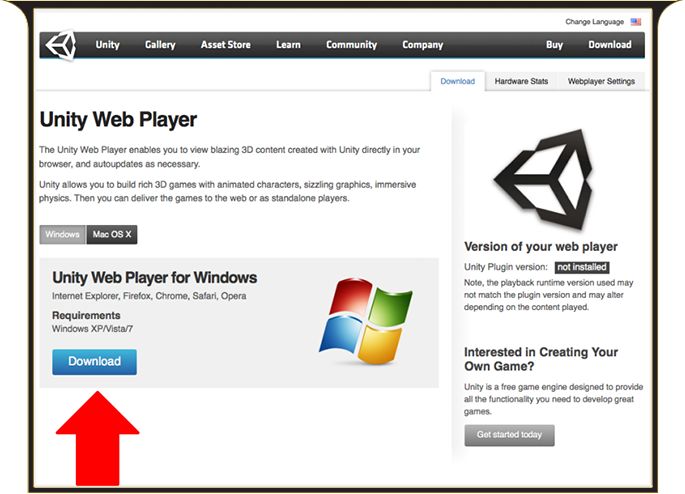

#UNITY WEB PLAYER SHOULD I REMOVE IT WINDOWS#
In this case, if we are on a Windows computer, we can see from the docs that PlayerPrefs entries are saved to the registry. The file could be structured like a database or could be a simple text file, it just depends on what the application developers felt like doing.

That file might be on a different computer across the country in the case of an online application, or it might just be in a sub folder called data. This may be something you haven’t given much thought to if you’re relatively new to programming, but saved data is just data that exists somewhere in a file. Location of saved dataĪnother important tidbit we can extract from the docs is where the location of the data from PlayerPrefs is actually saved. If we need to construct some sort of complicated string parsing system to mimic the behavior of a simple list, we might be barking up the wrong tree. This should be a big red flag for us when trying to figure out if this class is suitable for saving game data. You can probably envision a scenario where you would want to use a data type other than these three. You probably know that there are more data types than just string, float, and integer. Of course, then you also need to find a way to save a list of player IDs, which brings us to the next issue with using PlayerPrefs: you can only save data as a string, float, or integer. For example, you could choose to append a save file ID to each entry in PlayerPrefs and only load and save based on that ID. This means that if you want to have more than one save file for your application, you need to get creative. Method of saving dataįirst of all, PlayerPrefs saves data on a per-application basis. Right away, some things should raise some eyebrows. A good first step in this process is to check the docs for PlayerPrefs. Let’s start by taking a closer look at PlayerPrefs to see if it’s something we want to use to save our game data. The longer answer is that saving and loading data in Unity is actually a very deep topic without a clear best solution. The short answer is that saving a game state like this is generally a bad idea. This certainly seems to be about as easy as it gets, so it’s time to save some data, right? You can set a default return value if you haven't saved a "Level" yet with the second parameterĬurrentLevel = PlayerPrefs.GetInt("Level", 0) When you’re ready to load, getting the saved value is just as easy: PlayerPrefs.SetInt("Level", currentLevel) currentLevel is an integer variable representing the level the player is on All you need to do to save the level is the following: Well, this looks pretty easy in PlayerPrefs. You’ve decided you want to save the level your player is on when they quit the game so that the correct level loads back up when they start again.

Let’s say you’ve made a simple game with some number of levels. With PlayerPrefs, you can have an easy-to-use interface that allows you to start persisting some data! We’ll also discuss reasonable alternatives to using PlayerPrefs. In this article, we’ll go over what PlayerPrefs is, how, when, and when not to use it. The simplest solution is a Unity class called PlayerPrefs. From this search, you may be surprised that there are quite a few different answers, all varying in complexity.
#UNITY WEB PLAYER SHOULD I REMOVE IT HOW TO#
If you’re like most of us, your first instinct might be to do a quick search on how to save player data in Unity. Whether you’re relatively new to developing in Unity or you’ve got a few projects under your belt, you’ve most likely realized how useful it would be for players to save data. Why you should (or shouldn’t) save data with Unity’s PlayerPrefs Brian Drake Follow Brian is the owner of UpRoom Games, a small independent game studio focused on creating unique experiences and sharing game dev knowledge in Unity.


 0 kommentar(er)
0 kommentar(er)
